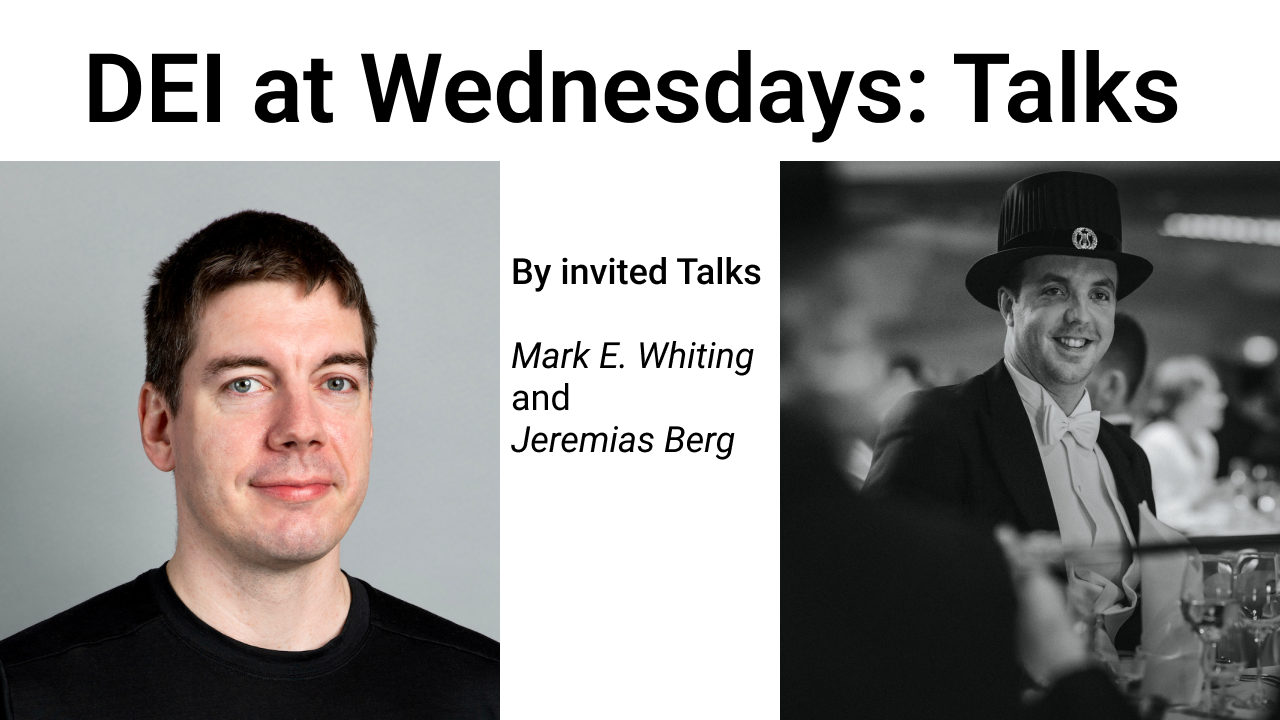DEI at Wednesdays: Talks, 16-03-2022

Mark E. Whiting
Short Bio: Mark E. Whiting builds systems to study how people behave and coordinate at scale. He is a postdoc under Duncan J. Watts in the Computational Social Science Lab at the University of Pennsylvania. He is affiliated with Computer & Information Science in Engineering and Applied Science and Operations, Information and Decisions at Wharton. He was previously a postdoc under Michael S. Bernstein in the HCI group in Computer Science at Stanford. He holds bachelor’s and master’s degrees in Industrial Design from RMIT and KAIST respectively, and a PhD in Mechanical Engineering from CMU. Find out more about Mark at whiting.me.
Abstract: We all possess common sense, or believe we do. But what exactly is it that we possess and how common is our possession of it? In spite of centuries of debate regarding the nature and purpose of common sense, spanning philosophy, sociology, psychology, and history, as well as more recently artificial intelligence, there remains no clear answer to these fundamental questions. In this talk, I propose an empirical framework for characterizing the content of common sense and quantifying its commonness with two measures: the extent to which everyone agrees on the truth of a statement, and the extent to which everyone knows what everyone else thinks about the truth of that statement. I will report on a large scale online experiment measuring common sense, and discuss how the approach used in this work can be expanded to study a range of traditionally elusive concepts about humans across scales, from individuals to societies. I will end by considering how this attitude toward measurement may also help navigate current empirical challenges in the social behavioral and economic sciences, such as generalizability and replicability.
--
Jeremias Berg
Short Bio: I am a 33-year old postdoctoral researcher from Finland. I obtained my PhD in 2018 from the University of Helsinki, afterwards I went on two research visits to Toronto and Melbourne before returning to Helsinki where I am currently working as an Academy of Finland funded researcher. My research interests include developing declarative solutions to computationally challenging (NP-hard) problems, especially optimization problems. My PhD research focused especially on the Boolean Optimization paradigm of Maximum Satisfiability (MaxSAT). I am the primary developer of the incomplete MaxSAT solver Loandra, one of the best performing solvers of the recent evaluations.
My research has received international recognition in the form of the 2020 Doctoral research award from the ACP and a best paper of 2020 award from the SAT conference. I am also an active member of the international community. I have frequently been on the PC of several central conferences (IJCAI, AAAI, SAT, CP) and in 2021 I was the chair of the doctoral program of the CP conference.
Finally, I am an active teacher with a wide range of experience in teaching students from primary school all the way to other teachers seeking complementary education.
Abstract: Talk on Logic-based Optimization
Modern declarative methods offer a general and flexible approach for solving NP-hard combinatorial optimization problems arising in various different domains of data analysis, industry and AI (e.g. verification, planning, scheduling). Roughly speaking, in a declarative approach an instance of the optimization problem at hand is represented as a set of mathematical constraints after which an automatic reasoning procedure (a solver) is used to compute a model of the constraints that corresponds to a globally optimal solution of the original problem.
While several effective constraint paradigms (e.g. integer programming, maximum satisfiability, pseudo-Boolean optimization, answer set programming) have been developed, choosing which one to use and how to represent an optimization problem with constraints is highly non-trivial. In this talk I overview modern constraint optimization and my work into developing state-of-the-art solvers that combine many types of constraints and reasoning techniques in their search for good solutions, resulting in more effective solutions to a wide range of important optimization problems. I will also highlight interesting future research directions such as incremental constraint optimization for efficiently solving sequences of optimization problems, and the development of a formal theory of optimality certificates for addressing the increasing demand for trustworthy and explainable AI.
